#Lunar Landers
Explore tagged Tumblr posts
Photo
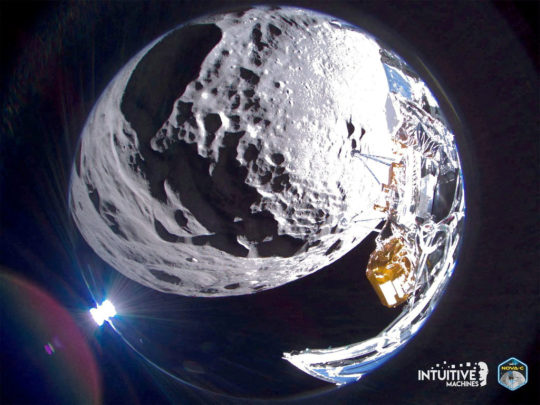
With only hours until it dies, lunar lander Odysseus sends back more photos of the moon | PBS NewsHour
19 notes
·
View notes
Text
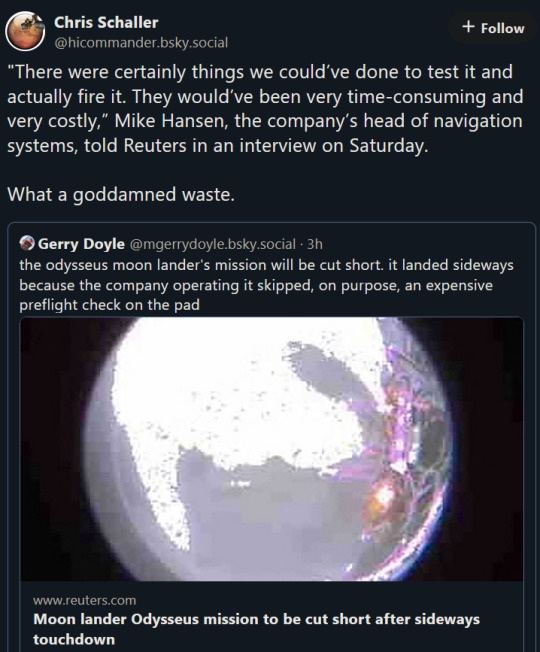
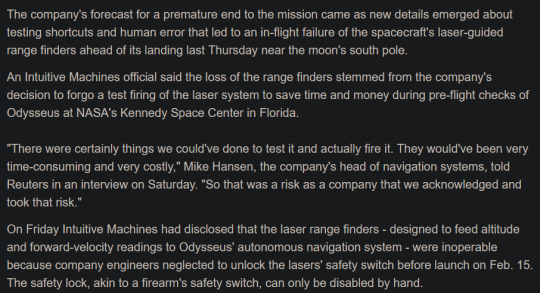

#this is why we should nationalize these companies#space#science#lunar lander#the moon#odysseus lander
15K notes
·
View notes
Text

i get to post my piece for the lunar labyrinth zine!! yay!!!
#lunar labyrinth#moon knight#marc spector#steven grant#jake lockley#layla el faouly#khonshu#gena landers#art tag
3K notes
·
View notes
Text

you could say im something of a #gamer
112 notes
·
View notes
Text
Hey guess what? Nobody's on the moon
#odysseus#Odysseus lander#lunar lander#its a dumb joke#but its my joke#unless someone else made it first#then its our joke
198 notes
·
View notes
Text



Happy moon day folks!! Painting with a lava lamp for light is such a vibe, especially for the retro space feel!
#based on a pic I found in nasa’s archives#my art#acrylic painting#moon day#apollo 11#apollo missions#astronaut#moon#lunar lander#space#space art#it’s not the best but I had fun so!
64 notes
·
View notes
Text


#astronomy#astronomers#universe#nasa#astrophotography#nasa photos#astrophysics#outer space#nasawebb#hubble space telescope#moon photography#moon#lunar lander#lunar#lunar and earth show#i love astronomy#astronomy facts#astronauts#space exploration#space#science#space shuttle#deep sky#sky photography#our universe#cosmos#solar system#planetary science#science facts#space science
72 notes
·
View notes
Text

Alternate Histories: A Triptych
The USAF's Project LUNEX, early Grumman LEM concept, and Von Braun's 1952 round-the-moon ship
#spaceship#spacecraft#space race#lunar lander#space travel#space exploration#space age#lunex#apollo#LEM
37 notes
·
View notes
Text
During the wee hours of Christmas Eve this year, before the gift wrapping begins and the aroma of gingerbread brightens the air, a spacecraft is set to launch to the moon. It's called the Peregrine Lunar Lander, named for the fastest flying bird on Earth. If all goes to plan, the robotic avian will zoom through space and fly into the moon's gravitational tides, then meticulously lower its orbit until eventually touching down on a region of ancient lunar lava flows known as the Bay of Stickiness, or Sinus Viscositatis. This mission will be one for the history books for several reasons, one of which is the fact it'll be the first to launch under NASA’s Commercial Lunar Payload Services (CLPS) initiative, created as a way for the agency to bring payloads to the moon without having to construct all the spacecraft necessary to bring those payloads there. In this case, the company Astrobiotic is behind the Peregrine lander and NASA's paying to stash a few things onboard.
Continue Reading.
122 notes
·
View notes
Text

fly me to the moon your poster might look fake but you will always be real TO ME!!!!
#the goods#fly me to the moon#scarlet johansson#channing tatum#kelly jones#cole davis#woody harrelson#jim rash#anna garcia#donald elise watkins#noah robbins#< i THINK thats everyone. i mean theres ray romano n shit in the bottom right but im not worrying about them#anyway I LOVED THIS MOVIE!!!! everyone should go see it for the moonlandingversary < yesterday. but whatever#actually no you SHOULDVE seen it yesterday!!!!!#this was meant to be a sortakinda halfsheet but i had too much fun and forgot about making the border neat sawree#i loveeeee drawing space stuff so much forever. character animator who has more fun digitally painting lunar landers than drawing character#ALSO before anyone gets on my case about the VAB not having a flag n logo til the 70s and 90s theyre there in the movie!!!!!!!!!!#they got it wrong not me!!!!!!!!!!!!!!!
27 notes
·
View notes
Text
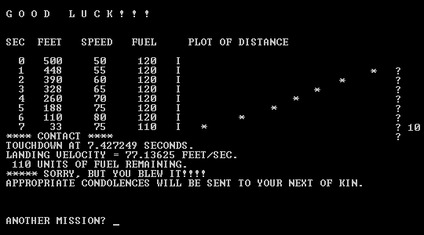
This is the kind of Lunar Lander game I remember playing as a kid in the mid 70s, perhaps my first interaction with a real computer. It was running on a PDP-11 (I am guessing) at the Talcott Mountain Science Center in Avon, Connecticut.
This place is a former Nike missile radar station, decommissioned in the late 60s. You drove for several miles through the woods, past the abandoned mounting pads for the radar antennas, to reach the site at the top.
Lunar lander itself is a simplistic game, you enter a fuel burn time each round and adjust it based on your velocity and remaining fuel, and try to reach the surface with as little delta-V as possible. (Usually with an amusing message if you failed)
Although this was text-only and you had only one input to give, the physics being modeled was real, and for me it was quite an immersive experience.
It was only a couple years after people had actually landed on the moon, and getting the chance to drive a lunar landing simulation on a real computer at a science center that was once a missile base, well that was astronaut stuff as far as preteen me was concerned.
I don't know that I have ever had as compelling a gaming experience since.
202 notes
·
View notes
Text

Happy Moon Landing Day! (July 20, 2023)
#moon landing day#apollo day#the moon#digital art#my art#I know this pic doesn't have anything specifically to do with the moon landing#I just wanted to make a nice moon#also I was in a hurry to make this and didn't want to deal with drawing a lunar lander/astronaut/rocket
242 notes
·
View notes
Text

These before and after photos taken by NASA's moon orbiter reveal the crash site of Vladimir Putin's failed Russian lunar lander. It slammed into the moon Aug.19, 2023, leaving a crater about 33ft (10m) wide. The probe was demolished on impact causing significant injury to Putin's ego.
#moon#Putin#Russia#lunar lander#luna-25#science#astronomy#space#outer space#aesthetic#politics#landscape#Simpsons#Nelson#haha#funny#lol#beauty-funny-trippy#Vladimir Putin#Russian#crash
93 notes
·
View notes
Text
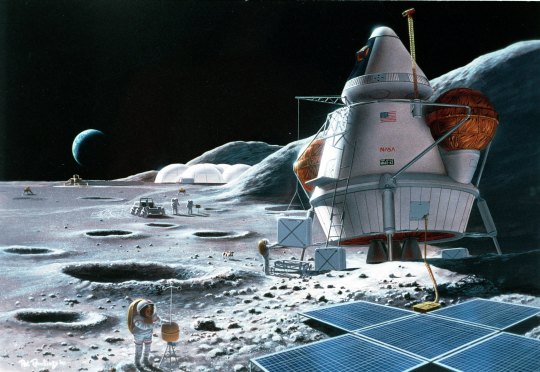
"(Artist's concept of possible exploration programs.)
Earth's Moon, just 3 days away, is a good place to test hardware and operations for a human mission to Mars. A simulated mission, including the landing of an adapted Mars excursion vehicle, could test many relevant Mars systems and technologies."
Artwork by Pat Rawlings, of SAIC.
Date: February 1995
NASA ID: S95-01563
34 notes
·
View notes
Text


The United States has returned to the lunar surface for the first time in more than 50 years after a privately-built spacecraft named Odysseus capped a nail-biting 73-minute descent from orbit with a touchdown near the moon’s south pole.
Amid celebrations of what NASA hailed “a giant leap forward,” there was no immediate confirmation of the status or condition of the lander, other than it had reached its planned landing site at crater Malapert A.
But later Intuitive Machines, the Texas-based company that built the first commercial craft to land on the moon, said the craft was “upright and starting to send data.”
The statement on X said mission managers were “working to downlink the first images from the lunar surface.”
The so-called “soft landing” on Thursday, which Steve Altemus, the company’s founder, had given only an 80% chance of succeeding, was designed to open a new era of lunar exploration as NASA works towards a scheduled late-2026 mission to send humans back there.
“Welcome to the moon,” Altemus said when touchdown when the 5.23pm touchdown was eventually confirmed, after about 10 minutes in which Odysseus was out of contact.
It was the first time any US-built spacecraft had landed on the moon since NASA’s most recent crewed visit, the Apollo 17 mission in December 1972, and the first visit by commercial vehicle following last month’s failure of Peregrine One, another partnership between the space agency and a private company, Astrobotic.

“Today, for the first time in more than a half century, the US has returned to the moon. Today, for the first time in the history of humanity, a commercial company, an American company, launched and led the voyage up there,” Bill Nelson, the NASA administrator, said.
“What a triumph. Odysseus has taken the moon. This feat is a giant leap forward for all of humanity.”
There was no video of Odysseus’s fully autonomous descent, which slowed to about 2.2mph at 33ft above the surface.
But a camera built by students at Florida’s Embry-Riddle Aeronautical University was designed to fall and take pictures immediately before touchdown, and NASA cameras were set to photograph the ground from the spacecraft.
The 14ft (4.3 metres) hexagonal, six-legged Nova-C lander, affectionately nicknamed Odie by Intuitive Machines employees, is part of NASA’s commercial lunar payload services (CLPS) initiative in which the agency awards contracts to private partners, largely to support the Artemis program.
NASA contributed $118m to get it off the ground, with Intuitive Machines funding a further $130m ahead of its February 15 launch from Florida’s Kennedy Space Center on a Falcon 9 rocket from Elon Musk’s SpaceX company.

The IM-1 mission, like the doomed Peregrine effort, is carrying a payload of scientific equipment designed to gather data about the lunar environment, specifically in the rocky region chosen as the landing site for NASA’s crewed Artemis III mission planned for two years’ time.
It is a hazardous area – “pockmarked with all of these craters,” according to Nelson – but chosen because it is believed to be rich in frozen water that could help sustain a permanent lunar base crucial to future human missions to Mars.
Scientists announced last year that they believed tiny glass beads strewn across the moon’s surface contained potentially “billions of tonnes of water” that could be extracted and used on future missions.
The risks are worth it, Nelson told CNN on Thursday, “to see if there is water in abundance. Because if there’s water, there’s rocket fuel: hydrogen, and oxygen. And we could have a gas station on the south pole of the moon.”
The planned operational life of the solar powered lander is only seven days, before the landing site about 186 miles from the moon’s south pole moves into Earth’s shadow.
But NASA hopes that will be long enough for analysis of how soil there reacted to the impact of the landing.
Other instruments will focus on space weather effects on the lunar surface, while a network of markers for communication and navigation will be deployed.
“Odysseus, powered by a company called Intuitive Machines, launched upon a SpaceX rocket, carrying a bounty of NASA scientific instruments, is bearing the dream of a new adventure in science, innovation, and American leadership in space,” Nelson said.


Through Artemis, NASA’s return-to-the-moon program that also has longer-term visions of crewed missions to Mars within the next two decades, the US seeks to stay ahead of Russia and China, both of which are planning their own human lunar landings.
Only the US has previously landed astronauts in six Apollo missions between 1969 and 1972, while five countries have placed uncrewed spacecraft there.
Japan joined the US, Russia, China, and India last month when its Smart Lander for Investigating the Moon (Slim) made a successful, if awkward touchdown after a three-month flight.
Two further Intuitive Machines launches are scheduled for later this year, including an ice drill to extract ingredients for rocket fuel, and another Nova-C lander containing a small Nasa rover and four small robots that will explore surface conditions.
https://www.theguardian.com/science/2024/feb/22/us-moon-landing-odysseus-intuitive-machines
youtube
US returns to lunar surface with for first time in over 50 years
23 February 2024
A spacecraft built and flown by Texas-based company Intuitive Machines landed near the south pole of the moon, the first US touchdown on the lunar surface in more than half a century, and the first ever achieved entirely by the private sector.
Communication with Odysseus seemed be lost during the final stages of the landing, leaving mission control uncertain as to the precise condition and position of the lander, according to flight controllers heard in the webcast.
US returns to lunar surface for first time in over 50 years: ‘Welcome to the moon.’
#Odysseus#Intuitive Machines#Youtube#NASA#Malapert A#moon#moon landing#spacecraft#Steve Altemus#lunar exploration#Bill Nelson#Nova-C lander#Odie#commercial lunar payload services (CLPS)#Artemis#Kennedy Space Center#Falcon 9#Elon Musk#SpaceX#IM-1 mission#Smart Lander for Investigating the Moon (SLIM)#lunar lander#earth
23 notes
·
View notes
